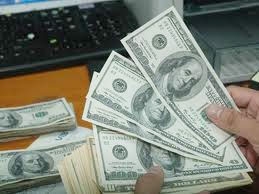Forex stores attacked
 |
| illustration photo |
State-owned corporations are set to provide a sizeable chunk of US dollars to the market.
Last week, State Bank governor Nguyen Van Giau revealed that by the end of March, total dollar-denominated banking system deposits of state owned corporations had reached $3.61 billion, including $376 million in term deposits.
“The State Bank will have further documents forcing these corporations to sell out. For $376 million in term deposits, this is clear evidence of dollar hoarding,” said Giau.
The concrete figures came after three weeks of compilation. The State Bank requested local lenders submit reports on dollar lending and deposits from early March.
In February, Prime Minister Nguyen Tan Dung stressed that the government would deploy all means necessary to bring the forex market under control and he directed state-owned enterprises to sell their dollars to the banking system.
Deputy Prime Minister Nguyen Sinh Hung said total dollar denominated deposits in the banking system stood at around $21 billion for corporates and individuals.
According to a BIDV official, $3.61 billion was a surprise as in BIDV alone, the amount has reached $600 million. “This order is a little bit reminiscent of the compulsory forex surrender requirement in the early 2000s. However, it is applicable for state-owned enterprises,” said the BIDV official.
In the early 2000s, Vietnam applied a policy forex surrender requirement, which forced enterprises including foreign-invested ones to convert a certain portion of dollar holdings to banks in Vietnamese dong.
Nguyen Thi Kim Thanh, head of Banking Strategy Institute, believed that by ordering state-owned enterprises to sell out dollar denominated deposits, the additional dollar supply could cover demand.
“The unofficial foreign exchange market would further stabilise in tandem. When we look at the forex market, we also need to look at trade shortfall,” said Thanh.
On the trade deficit front, Vietnam’s deficit for March was at $1.2 billion, matching the result a year ago.
HSBC economist Sherman Chan said that it was too early to assess the effectiveness of recent tightening moves or the impact of February’s 7 per cent dong devaluation on trade. The fact that the trade gap remained uncomfortably wide was likely to keep policymakers on their guard, he said.
“However, provided tightening measures are duly implemented, we remain optimistic that the trade balance will improve in coming months,” said Chan.
Chan added that directives to cut public expenditure and rein in the state-owned sector’s consumption, should have a meaningful impact for controlling imports.
“Meanwhile, as Japan accounts for roughly 10 per cent of Vietnam’s exports, the earthquake is most likely to take a toll on Vietnam’s outbound shipments in the next few months. However, as Japan gets back on its feet and reconstruction begins later in the year, demand for Vietnam’s exports should pick up accordingly,” added Chan.
What the stars mean:
★ Poor ★ ★ Promising ★★★ Good ★★★★ Very good ★★★★★ Exceptional
 Tag:
Tag:
Related Contents
Latest News
More News
- Cashless payments hit 28 times GDP in 2025 (February 04, 2026 | 18:09)
- SSIAM and DBJ launch Japan Vietnam Capital Fund (February 04, 2026 | 15:57)
- Banks target stronger profits, credit growth in 2026 (February 04, 2026 | 15:43)
- Vietnam on path to investment-grade rating (February 03, 2026 | 13:07)
- Consumer finance sector posts sharp profit growth (February 03, 2026 | 13:05)
- Insurance market building the next chapter of protection (February 02, 2026 | 11:16)
- NAB Innovation Centre underscores Vietnam’s appeal for tech investment (January 30, 2026 | 11:16)
- Vietnam strengthens public debt management with World Bank and IMF (January 30, 2026 | 11:00)
- Corporate bond market poised for stronger growth cycle (January 28, 2026 | 17:13)
- Vietnam's IPO market on recovery trajectory (January 28, 2026 | 17:04)






















 Mobile Version
Mobile Version